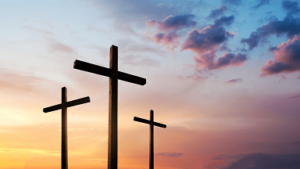This is Faith in Play #87: Crosses, for February 2025.
Jesus famously called potential followers to take up their own crosses and follow Him. This has led to the expression my cross to bear, which people apply to everything from illnesses to inlaws. I would suggest, however, that none of those things are your cross. Reverend Derek Prince captured the core of this in his words, “Your cross is where your will and the will of God cross.” That, you see, is where you have to die.

That could be the entire lesson. It is the part that we have to understand in our own personal lives. We all have dreams, wants, desires, goals, expectations for what we want our lives to be like. Meanwhile, God has plans, intentions, directions for us. We have this conflict between what we want and what God wants, and at that point of conflict we are called to lay down our lives and accept His will. If you can see that, this article has accomplished something important.
I want to extend it, though. I want to go beyond our personal faith into our gaming. Of course, there may be times when God’s will for us personally impacts our gaming, what we play and how, and in those circumstances of course I encourage you to embrace the will of God. (I discussed this a few years back in mark Joseph “young” web log post #239: A Departing Member of the Christian Gamers Guild.) But taking it down to a smaller level, many of our characters are servants of a god–the obvious ones like clerics and paladins, but also ordinary adventurers who have embraced a religion within the game world. We have a tendency to treat those gods as servants of our characters–we pray for healing or miracle and expect that this is a power granted to us unconditionally by our deity. It is not, and it is important to grasp that it is not: divine powers, answers to prayers, are the work of our gods to bring about their objectives in the world, in our lives. Deities work their wonders on behalf of characters who are in turn advancing the will of the deities.
This brings us to the issue. Whatever the objectives of your in-game deities are, they expect their followers, and not only their clergy, to be working toward those objectives, and indeed there should be situations in which the expectation is such that they object to or even oppose the characters working toward their own objectives.
How that is handled will vary not merely from game to game but from deity to deity, character to character, and even situation to situation. Sometimes, though, the will of the character will be contrary to the will of his deity, and in those situations the questions are whether the character will set aside his desires in favor of his god’s directives, and what will happen if he does not.
This of course is also the question in the larger world: What will you do when your will and the will of God cross?
